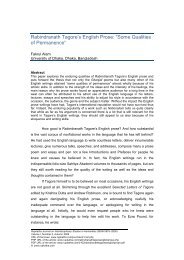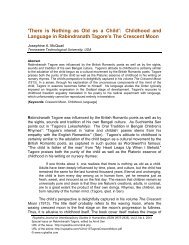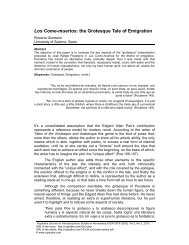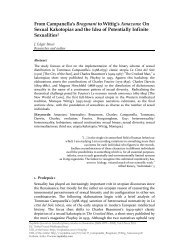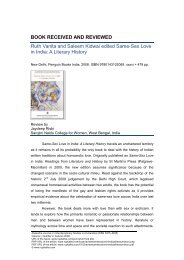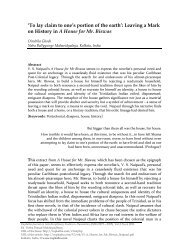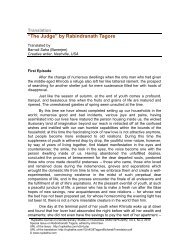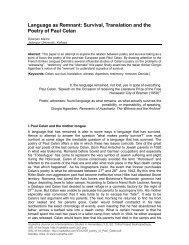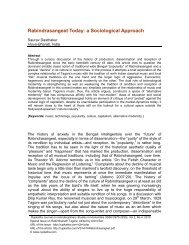In the World of Men: Tagore's Arrival in the Spiritual Domain of ...
In the World of Men: Tagore's Arrival in the Spiritual Domain of ...
In the World of Men: Tagore's Arrival in the Spiritual Domain of ...
Create successful ePaper yourself
Turn your PDF publications into a flip-book with our unique Google optimized e-Paper software.
435 Rupkatha Journal Vol 2 No 4<br />
so easy to do some good for o<strong>the</strong>rs. Tagore recounts his amazement <strong>in</strong> a<br />
number <strong>of</strong> <strong>in</strong>stances dur<strong>in</strong>g this period:<br />
….One day afire broke out <strong>in</strong> a village nearby. The people were so utterly dazed<br />
that <strong>the</strong>y could do noth<strong>in</strong>g. Then <strong>the</strong> men from a neighbour<strong>in</strong>g Muslim village<br />
came rush<strong>in</strong>g and fought <strong>the</strong> fire. There was no water and thatched ro<strong>of</strong>s had to<br />
be pulled down to stifle flames. You have to use force <strong>in</strong> order to do good! And<br />
<strong>the</strong>y came to me say<strong>in</strong>g, ‘what luck that our ro<strong>of</strong>s were dismantled- that is how<br />
we have been saved’. They were happy that <strong>the</strong> beat<strong>in</strong>g benefited <strong>the</strong>m; but I<br />
was filled with shame by <strong>the</strong>ir submissiveness…<br />
<strong>In</strong> my estate, <strong>the</strong> river was far away and lack <strong>of</strong> water was a serious problem. I<br />
said to my tenants, ‘If you dig a well, I shall get it cemented’. They replied, ‘you<br />
want to fry fish <strong>in</strong> <strong>the</strong> oil <strong>of</strong> <strong>the</strong> fish itself! If we dig <strong>the</strong> well you shall go to heaven<br />
through <strong>the</strong> accumulated virtue <strong>of</strong> hav<strong>in</strong>g provided water for <strong>the</strong> thirsty, while we<br />
shall have done <strong>the</strong> work’. The idea obviously, was that an account <strong>of</strong> all such<br />
deeds was kept <strong>in</strong> heaven and while I, hav<strong>in</strong>g earned great merit, could go to <strong>the</strong><br />
seventh heaven, <strong>the</strong> village people would simply get some water. I had to<br />
withdraw my proposal…<br />
I had built a road from our estate <strong>of</strong>fice up to Kushtia. I told <strong>the</strong> villagers who<br />
lived close to <strong>the</strong> road, ‘The upkeep <strong>of</strong> this road is your responsibility. You can<br />
easily get toge<strong>the</strong>r and repair <strong>the</strong> ruts’. It was, <strong>in</strong> fact, <strong>the</strong>ir ox-cart wheels that<br />
damaged <strong>the</strong> road and put it out <strong>of</strong> use dur<strong>in</strong>g <strong>the</strong> ra<strong>in</strong>s. They replied, ‘Must we<br />
look after <strong>the</strong> road so that gentlefolk from Kolkata can come and go with ease?’<br />
They could not bear <strong>the</strong> thought that o<strong>the</strong>rs should also enjoy <strong>the</strong> fruits <strong>of</strong> <strong>the</strong>ir<br />
labour. Ra<strong>the</strong>r than let that happen, <strong>the</strong>y would put up with <strong>in</strong>conveniences. 28<br />
But his amazement turns <strong>in</strong>to a heart-felt pity, when he analyses <strong>the</strong>ir<br />
psychology and realizes <strong>the</strong> reason <strong>of</strong> <strong>the</strong>ir helplessness:<br />
The poor <strong>in</strong> our villages have borne many <strong>in</strong>sults; <strong>the</strong> powerful have done many<br />
wrongs. On <strong>the</strong> o<strong>the</strong>r hand, <strong>the</strong> powerful have to do all <strong>the</strong> welfare work. Caught<br />
between tyranny and charity, <strong>the</strong> village people have been emptied <strong>of</strong> self<br />
respect. They ascribe <strong>the</strong>ir miseries to s<strong>in</strong>s committed <strong>in</strong> previous births, and<br />
believe that, to have a better life, <strong>the</strong>y must be reborn with a greater fund <strong>of</strong><br />
merit. The conviction that <strong>the</strong>re is no escape from suffer<strong>in</strong>g makes <strong>the</strong>m<br />
helpless. 29<br />
No one else <strong>in</strong> his times, had been will<strong>in</strong>g to th<strong>in</strong>k <strong>of</strong> <strong>the</strong>se helpless people, much<br />
less to work for <strong>the</strong>m. But Tagore made his strategy. He realized that a healthy<br />
state <strong>of</strong> society could never be reached where <strong>the</strong> <strong>in</strong>dividual had lost his <strong>in</strong>itiative<br />
and confidence and looked up for assistance from o<strong>the</strong>rs <strong>in</strong> matters where he<br />
could help and guide himself best. Help from outside would keep <strong>the</strong>m ‘big,<br />
helpless children’ for ever. Hence his rural community development programme<br />
concentrated on <strong>the</strong> tw<strong>in</strong> pr<strong>in</strong>ciples <strong>of</strong> self help and enlightenment. From <strong>the</strong><br />
former emerges Tagore, <strong>the</strong> nationalist, from <strong>the</strong> latter, Tagore, <strong>the</strong> educationist,<br />
and both <strong>of</strong> <strong>the</strong>m contributed jo<strong>in</strong>tly, immensely to keep <strong>the</strong> spiritual doma<strong>in</strong> <strong>of</strong><br />
<strong>the</strong> nation vibrant and <strong>in</strong>dependent.



